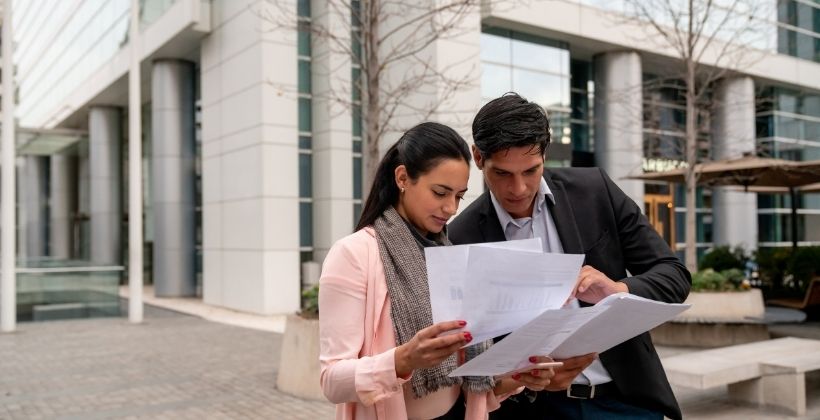Bring your partner through spouse visa of Netherlands
You have already received your MVV (Authorization of Temporary Stay) visa and study permit and weeks away from starting class at your dream university. Now, you wish to bring your partner through the spouse visa of the Netherlands.
Well, the procedure depends on you and your spouse's/ registered partner's/common law partner's nationality. This article will cover steps to bring your spouse/registered partner with you to the Netherlands.
Please note that we will use the term partner to refer to a spouse/common-law partner/ registered or unregistered partner.

If your partner comes from Switzerland or any European Union(EU) or European Economic Area (EEA), then your partner doesn't require a valid residence permit of the Netherlands. But, your partner needs to register if s/he plans to stay more than 90 days.
Your family member or relative doesn’t require a residence permit if they are nationals of any of the following countries:
Austria, Belgium, Bulgaria, Croatia, Cyprus, Denmark, Estonia, Finland, France, Germany, Greece, Hungary, Iceland, Italy, Ireland, Latvia, Liechtenstein, Lithuania, Luxemburg, Malta, Norway, Poland, Portugal, Romania, Slovakia, Slovenia, Spain, Sweden, Switzerland, The Czech, Republic.
Fulfilling Conditions to Apply for Spouse Visa of Netherlands
Not everyone can apply for a residence permit for your partner. You must need to fulfill these three conditions to apply for the spouse visa of the Netherlands-
You have Dutch nationality or have a residence permit. Please note: If you have a temporary residence permit in the Netherlands as an exchange youngster, au pair, for work experience as a trainee (study purposes) or apprentice (work purposes), or seasonal labor, you cannot apply for a residence family member or relative.
The family member or relative will be living with you.
You have sufficient money to support your family member or relative. This means that you earn at least the legal minimum wage or a percentage thereof. For more information, see www.ind.nl.
Your partner needs to meet the following conditions to apply for the partner visa of the Netherlands:
You and your partner must be aged at least 18 years.
You want your unmarried partner to come to the Netherlands, that can only happen if you and your partner have a lasting and exclusive relationship with each other. You and your partner must be aged at least 21.
If your family member (not partner) is planning to apply for a resident permit, then the following conditions need to be met:
Has a valid passport.
Does not pose a risk to public order or national safety. The person has not been found guilty of a criminal offense and has not been involved in war crimes, terrorism, or crimes against humanity.
Must register in the Municipal Personal Records Database in the Netherlands at the same address as you.
Must undergo a test for tuberculosis in the Netherlands. This test must be carried out within three months of the residence permit being issued. If necessary, your family member or relative must be treated for TB. Does your family member or relative have the nationality of one of the countries listed in the appendix ‘Exemption from the obligation to undergo tuberculosis (TB) test’? Then the TB test is not required.
Must be insured in the Netherlands for healthcare costs. This test must be carried out within four months of the residence permit being issued.
Must go through the civic integration process in the Netherlands.
Important Documents to Apply for the Spouse Visa of Netherlands
Before applying for a residence permit, collect all the following documents and evidence. Starting 2-3 months early can help you easily navigate the spouse visa of the Netherlands quickly and efficiently. Examples of evidence include:
records that indicate your income;
a copy of your passport or those of your family member or relative;
the marriage certificate or certificate of a registered partnership;
an unmarried status declaration;
documents that demonstrate parental custody;
evidence that the civic integration exam has been passed;
a legalized and translated birth certificate is also necessary to register in the Municipal Personal Records Database in the Netherlands.
You can find more information on applying here.
Documents are required to be legalized by competent authorities. This can be done by respective "Document issuing authority,” Embassy of the Netherlands, or Dutch Consulate. You will find more information on legalizing documents in the "legalizing document" section.
Regular Provisional Residence Permit (MVV)
An MVV is a special entrance visa that you need to apply for if you plan to stay more than 90 days. Your nationality defines if you need an MVV or not.
To apply for MVV, you need to have the purpose of visiting the Netherlands. This could be to stay with a family member, study or work, spouse or partner, etc. You can either apply for MVV and Residence Permit together or separately. Before you apply for MVV, you need to pass the civic integration examination abroad.
Check this official website to know more.
What is the application procedure for a residence permit?
So, now with all the necessary documents, you can apply for the residence permit. Applying for a residence permit will require you to have Regular Provisional Residence Permit(MVV). In some cases, you won't need MVV. See below if you don't need MVV.
- Residence Permit without MVV: Before your family member/spouse/unregistered partner can come to the Netherlands, you need to apply for a resident permit. Learn more about applying for a residence permit here.
- Residence Permit with MVV: You can apply for both residence permit and MVV in one go. You can collate all the necessary documents with help from your family member or relative. If something is not clear, you can ask for help from the IND desk. If the IND issues an MVV, you can pass this onto your family member or relative. Your family member or relative must then collect the mvv within 3 months from the Dutch embassy or consulate. He then has 90 days to travel to the Netherlands. Once he has arrived in the Netherlands, he can collect his residence permit within 2 weeks. The IND will notify you as to where and when he can collect the residence permit. Learn more about applying for a residence permit and MVV here.
When do I not need an MVV?
- You are a citizen of one of the following countries:
- Australia, New Zealand, Canada, Japan, Monaco, Vatican City, United States of America, or South Korea.
- An EU/EEA Member State or Switzerland.
- You will live in the Netherlands with a family member of an EU/EEA country or Switzerland. You yourself have a nationality for which an mvv would be mandatory. You can apply for verification against EU law.
- You have a valid residence permit in the Netherlands.
- You had a valid residence permit in the Netherlands. You now no longer have it. You submit a new application for residence within 2 years after your previous residence permit has expired. You have lived in the Netherlands for the whole time during that period of 2 years.
- You have a valid residence permit for another Schengen country. You have a recognized sponsor in the Netherlands, and you meet all conditions. In this case, your family members also do not need to apply for an mvv. Your family members should have a residence permit to stay with you in that other Schengen country.
- You have a residence permit as a long-term resident EC issued by an EU Member State. In this case, your spouse and/or minor child also need not apply for an MVV. You must, however, already have lived together with them in the other EU country.
- You have had, for at least 18 months, a valid European blue card (Blue Card) in another participating EU/EEA country. You are applying for a residence permit in the Netherlands as 'holder of a European blue card.' In this case, your family members also need not apply for an MVV.
- You were born in the Netherlands and live with your parent (s). At the time you apply for a residence permit, you are aged 12 or younger. Your parent (s) live in the Netherlands with a valid residence permit.
- You are applying for a residence permit for a start-up.
- You are transferred to a company branch in the Netherlands within the framework of (long term) intra EU-mobility.
- Other: special and individual circumstances apply to the foreign national and cannot return to the country of origin to apply for an MVV.
When do I need an MVV?
Your nationality defines whether you have to apply for an MVV or not. Even if you are not living in your country of origin or hold a residence permit in another country, you can find more information.
# How long is my residence permit valid?
The validity of your residence permit depends on you and your family member fulfilling all the requirements. If you are a Dutch citizen, your family member will be issued a residence permit with 5 years validity. If you are not Dutch, then your partner's residence permit will expire on the same date as yours.
# Can my partner work in the Netherlands?
If you are permitted to work, your spouse/partner will be able to work in the Netherlands. For that, your spouse/partner needs to apply for a work permit.
Applying and having an MVV and/or Resident Permit for your partner may take some time. So, it may be possible that you will be traveling to the Netherlands before your family.
Note:
For bringing your spouse, you have to demonstrate you have a minimum income equal to or higher than the minimum Dutch welfare standard. You also need to demonstrate how you would be able to pay for health insurance and housing.
Unmarried students bringing their permanent partners require even more official and verified documents. In short, you have to sign a sponsor declaration, by which you declare to act as a guarantor for the costs incurred by the Dutch State in respect of the stay of your partner/children, as well as the costs of return to a country where admission of that foreign partner is guaranteed.

Cover Letter

Forwarding Letter

Student Financial Planning

Explanation Letter of Source of Fund

Explanation on previous Visa Rejection


